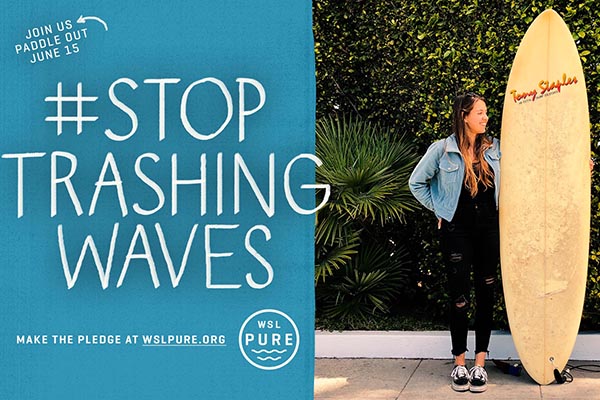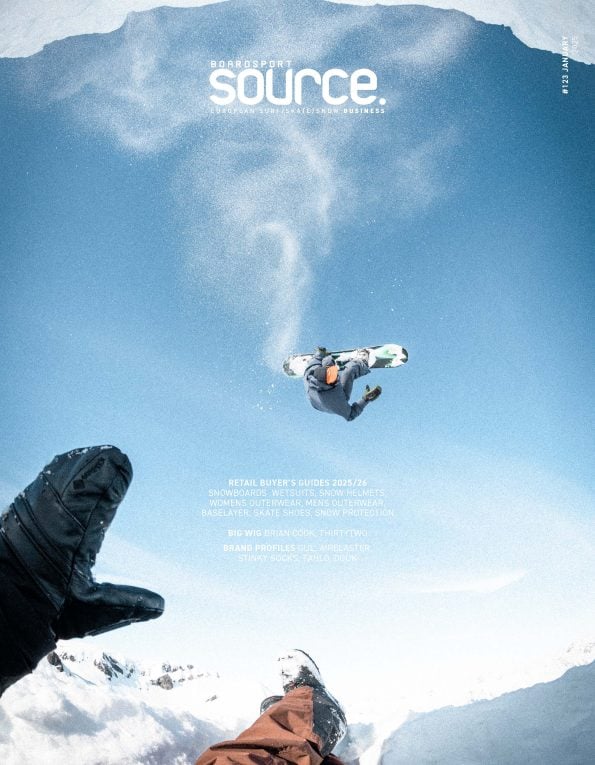
WSL Announce New Efforts In Sustainability
World Surf Leauge announced their plans for sustainability moving forward, by the end of 2019 they plan to eliminate single-serve plastics, becoming carbon neutral and pledging to leave each place better than it was found. Find out more below and what you can do to be involved.
Press Release: LOS ANGELES, Calif./USA (Tuesday, June 4, 2019) – The World Surf League (WSL) today announced a series of sustainability commitments that set a new standard for global professional sports. These commitments – designed to inspire, educate and empower ocean lovers while addressing critical environmental issues – apply to all WSL Championship Tour and Big Wave Tour events and include:
- Becoming carbon neutral globally by the end of 2019;
- Eliminating single-serve plastics by the end of 2019; and
- Leaving each place better than it was found.
This effort builds on the WSL’s existing ocean conservation efforts, including WSL PURE, its non-profit arm, which stands for Protecting Understanding and Respecting the Environment. As part of its announcement today, the WSL is also launching a global marketing campaign and inviting members of the ocean community to make the PURE pledge to “Stop Trashing Waves” and join a worldwide paddle out on June 15 in honor of International Surfing Day, founded by the Surfrider Foundation.
“The WSL is incredibly proud to break new ground in sports in the urgent battle against climate change and ocean pollution,” said WSL CEO Sophie Goldschmidt. “We believe it’s our responsibility to be ‘all in’ with our efforts to protect the ocean and beaches amid the devastating climate crisis we all face. We invite everyone who cares about the ocean to join us.”
Some facts that have propelled the WSL to make these commitments:
- Because of increased global temperatures, the ocean has absorbed more than 90 percent of the excess heat in the atmosphere, which causes more frequent and intense storms and dangerously rising sea levels.¹
- Approximately 30 percent of the carbon in the atmosphere is absorbed by the ocean, causing acidification that harms coral reefs and other marine life.²
- Plastics break down into small microparticles that are ingested by marine life, ultimately entering the food we eat and water we drink.³
The specifics of the WSL commitments include:
- Becoming carbon neutral globally by the end of 2019, including at WSL Championship Tour and Big Wave Tour events:
- The WSL is offsetting its carbon footprint by investing in and supporting projects such as REDD+ (reduce emissions from deforestation and forest degradation) and VCS (Verified Carbon Standard) certified carbon offset projects that have a focus on restoring and protecting natural ecosystems and renewable energy ecosystems and are based in each of the WSL’s regions. For example:
- In Asia Pacific: The Katingan Mentaya project in Borneo is a REDD+ peat swamp forest that fights deforestation from mining and palm oil plantations. VCS and Triple Gold Certified project recognized for its positive social impacts (34 communities; 45k people) and biodiversity (5 Critically Endangered, 8 Endangered, and 31 Vulnerable species).
- In South America: The Santa Vitoria do Palmar and Chui wind farm in Brazil (a United Nations Clean Development Mechanism Certified Emission Reduction project) which powers 400,000 homes, and the ceramic factories of Argibem, São Sebastião, and Vulcão which run on renewable biomass instead of native timber from endangered and unique Brazilian ecosystems, and also has positive social impacts in the community schools.
- In Africa: The Maasai Wilderness Conservation Trust located in Kenya, which supports the Chyulu Hills REDD+ project to promote climate change mitigation and adaptation, restores biodiversity and creates alternative livelihoods.
- In North America: Almost 24,000 acres of Redwood forest protected from traditional logging to store carbon and safeguard endangered wildlife (Coho Salmon and Northern Spotted Owl) in the coastal watersheds of the Garcia River Forests in Mendocino County.
- The WSL will also reduce its carbon footprint by regionalizing its operation, limiting non-essential travel and implementing policies to reduce carbon emissions at its offices.
- The WSL carbon offset program is calculated and curated in partnership with STOKE (Sustainable Tourism & Outdoors Kit for Evaluation), a certification organization with standards built specifically for surf and mountain tourism operators, destinations, and affiliated events.
- The WSL is offsetting its carbon footprint by investing in and supporting projects such as REDD+ (reduce emissions from deforestation and forest degradation) and VCS (Verified Carbon Standard) certified carbon offset projects that have a focus on restoring and protecting natural ecosystems and renewable energy ecosystems and are based in each of the WSL’s regions. For example:
- Eliminating single-serve plastics from WSL Championship Tour and Big Wave Tour events by the end of 2019: The WSL is specifically targeting items related to food-service like bottled beverages, cutlery, and cups, as these single-serve items are often not recyclable.
- The WSL already provides clean drinking water stations for fans to refill their bottles and choose compostable materials where possible for food service.
- Leaving each WSL Championship Tour and Big Wave Tour stop better than it was found: The WSL is reducing its event footprint and developing a financial grant program to commit money to local projects and non-profits that are working to safeguard our coasts and protect these habitats.
“So stoked that the WSL is setting this amazing example, and I hope all other professional sports follow their lead – and soon!” said Dr. Ayana Johnson, marine biologist and founder of Ocean Collective and Urban Ocean Lab. “Where governments fail to lead, business can and should step all the way up to address our intertwined climate and biodiversity crises.”
“I think it’s a great stance and an important message to send to people around the world,” said 11-time WSL Champion Kelly Slater. “The ocean is vital to everyone, for food, for oxygen and especially to us surfers. I think everyone should make it their priority to care about this issue and make changes in their lives to help.”
As part of the commitment, the WSL is launching a multi-faceted digital and print marketing campaign, titled “Stop Trashing Waves.” Creative features pro surfers Conner Coffin, Filipe Toledo, Carissa Moore, Coco Ho, Tatiana Weston Webb, Paige Alms, Greg Long, Kai Lenny, and Bianca Valenti and will appear across social media and other platforms.
“In the sport of surfing and beyond, it’s imperative that we all act immediately,” said Reece Pacheco, WSL SVP Ocean Responsibility and Executive Director, WSL PURE. “Looking ahead, we plan to inspire more and more people to join us in reducing and offsetting their emissions through our upcoming carbon calculator and offset platform.”
More information about the WSL commitments and tips for the general public, as well as details and locations for paddle outs, can be found at WSLPURE.org.







